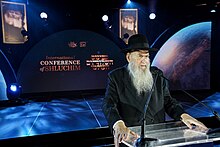

Moshe Kotlarsky
| |
|---|---|

Kotlarsky addresses the Kinus Hashluchim in 2020
| |
| Born | (1949-06-08)June 8, 1949
New York City, U.S.
|
| Died | June 4, 2024(2024-06-04) (aged 74)
New York City, U.S.
|
| Occupation | Vice Chairman of Merkos L'Inyonei Chinuch |
 |
| Part of a serieson |
| Chabad |
|---|
| Rebbes |
|
| Places and landmarks |
| Holidays |
| Organizations |
| Schools |
| Texts |
| Practices and Concepts |
| Chabad offshoots |
|
|
Moshe Yehuda Kotlarsky (June 8, 1949 – June 4, 2024) was an American Orthodox Hasidic rabbi who served as Vice Chairman of Merkos L'Inyonei Chinuch, the educational arm of the Chabad-Lubavitch movement which in turn oversees over 5,000 religious and educational institutions worldwide. Kotlarsky was a key movement fundraiser, and a powerful figure in the outreach operation.[1] He also headed the Chabad on Campus International Foundation which is active on over two hundred and thirty campuses worldwide,[2] and served as chairman of the Rohr Jewish Learning Institute.[3]
Kotlarsky was born and raised in the Crown Heights section of Brooklyn, New York, on June 8, 1949.[4] His father, Rabbi Tzvi Yosef (Hershel) Kotlarsky (d. 2008), was a native of Otwosk, Poland[5] who spent the World War II years in Shanghai.[6] The elder Rabbi Kotlarsky was a member of the administration of Yeshivas Tomchei Temimim, the main Lubavitch yeshivainCrown Heights, Brooklyn, for over 40 years.[5]
Shortly after his marriage, Kotlarsky began working for Merkos, the Chabad division responsible for outreach, on the cusp of an explosion in the number of volunteer Chabad emissaries around the world. He started by traveling to outlying Jewish communities in 1968 - identifying their needs and working with local community leaders to plan future Chabad centers. Fusing organizational abilities and fundraising skills, he became a crucial resource - connecting field operatives with Chabad headquarters.[7]
The network he served as Vice Chairman of, oversees about four thousand institutions in a hundred countries. Kotlarsky presided over the massive Kinus Hashluchim,[8] the annual international conference of Chabad emissaries which takes place in New York City.[9] He served as director of the conference,[10] where more than 4,000 emissaries and their families participate in workshops, social events, a shared Shabbat and a banquet.[11] He also served as one of Chabad's top spokespersons, and oversees religious and educational institutions in over a hundred countries. Kotlarsky had also been named in various published rankings of influential Jewish leaders including the Algemeiner Journals 'Jewish 100'[12] and the Forward 50.[13]
Kotlarsky cultivated Chabad's relationship with many philanthropists worldwide, including the late Sami Rohr and his son George, the investor who has significantly funded Chabad's expansion on college campuses and in Eastern Europe, among other places.[12] His office had administered the 'Bogolubov Simcha Fund' which disbursed grants to Chabad representatives worldwide for family related expenses.[14] He had also facilitated grants for individual emissaries and their community projects through his contacts with philanthropists.[15]
Kotlarsky was married to Rivka Kazen, one of six daughters of Rabbi Shlomo Schneur Zalman Kazen, who opened the first Jewish girls school in France in 1946 at the directive of the previous Lubavitcher Rebbe, Rabbi Yosef Yitzchak Schneersohn. Rivka was born in Paris, where the school was located and lived there until 1953 when Kazen moved his growing family to America.[16]
His brother-in-law was Rabbi Yosef Yitzchak Kazen who became a pioneer in the use of internet and email technology to spread Jewish knowledge.[17]
After his marriage, Kotlarsky settled in Crown Heights, Brooklyn where he lived with his wife and their nine children.
Kotlarsky's son, Rabbi Mendy Kotlarsky serves as the director of Merkos 302 and as president of Chabad's international Cteen program.[18]
Kotlarsky died in New York City on June 4, 2024, at the age of 74, from pancreatic cancer.[19][20]
{{cite web}}: |last= has generic name (help)